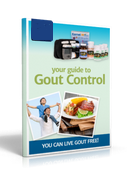1) Try to get an accurate diagnosis if possible.
HOWEVER, these suggestions are accurate and helpful with any inflammatory attack and can be followed, regardless of a firm diagnosis. Blood testing can be very misleading. Arthrocentesis, or joint aspiration, is the only secure method of evaluating any crystallized deposits in the joints.
2) Take the right anti-inflammatory medications.
NSAIDS (nonsteroidal anti-inflammatory drugs) can be helpful in the short term. Over the counter options would include Ibuprofen, Naproxen, and Aspirin (325mg not 81mg). Physician prescribed options would include Colchicine (Colcyrs), Indocin (Indomethacin), and/or a steroid such as Prednisone. These medications are not made for everyone. NSAIDS may not be appropriate for those with kidney concerns/renal disease and steroids could be dangerous for those with Diabetes. Be sure to discuss all options carefully with your physician.
AVOID Tylenol! (click to learn more)
3) Keep pressure off of the affected joint(s).
Even the slightest weight of a bed sheet can be excruciating when under a Gout attack. This suggestion goes without saying, for the most part. You’ll know what you can and cannot tolerate and won’t have to guess at this one.
4) Rest, elevate, and soft oil rub
Rest the inflamed areas above the heart whenever possible, while keeping it warm at all other times, including when in bed with a sock/wrap that is not too tight. At bedtime, rub a generous amount of castor oil on the inflamed areas before bed and wrap well with an ace bandage to keep warm overnight.
5) Ice and Heat options:
Soak the inflamed area in ice water for about 3-4 minutes if you can stand it. Follow by one to two minutes of hot water. Alternate between the two for about 30 minutes, twice per day. If your water is chlorinated, be sure to use an ice pack and heating pad instead.
6) Aim to consume a pH balanced diet.
Don’t stress about purines as this method can get you into more trouble. Learn more.
7) Drink plenty of water.
A continuous flow and a reliable source of water is essential to every part of our body and our health. When it comes to Gout specifically, it’s management heavily relies on the blood, the liver, the kidneys, the digestive system, and the tissues to function properly and to remove waste from the body. These essential keys are critical to all areas of your health, and more specifically to uric acid removal and management. Learn more about what kind of water is best. Click here.
8) Avoid stress and meditate.
Chronic stress disrupts the essential communication between the major systems of the body. Stress can deplete the good bacteria and strip vital nutrients from the body. Prolonged, overexposure to cortisol and other stress hormones can wreak havoc on the mind and body. Chronic stress can reprogram the cells in our body and disrupt all its processes. Stress management and reduction is possible, and crucial. This can be achieved through several techniques including exercise, meditation, EFT, music, reading, aromatherapy and more.
9) Learn more about all natural cleansing and maintenance programs such as what the trusted company ‘Alternative Health Research’ has to offer.
Their site is full of great, FREE information and all natural product options. GC® GoutCare and Flamasil® has been helping tens of thousands since 1998. For even more anti-inflammation (free) tips click here.
| Gout Stage Assessment- What Stage Am I In? |
| Gout Test and Full Personal Evaluation |
